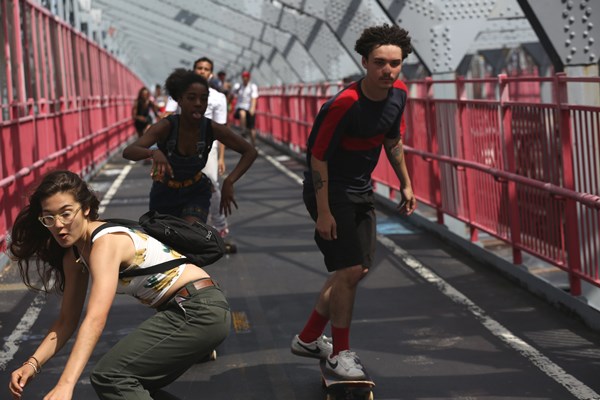“My mom doesn’t want me to _____ (sing/ dance/kiss girls/kiss boys/split atoms in the science lab).” Teen movies since the1950s have offered up youthful passion quashed by fuddy-duddy parents. And so does Crystal Moselle’s Skate Kitchen, the story of a shy Long Island teenage girl whose world opens up when she joins a female skateboard posse on the Lower East Side. The difference between Moselle’s film and others in the genre is that the film’s documentary techniques give it a more lived-in, urban feel than most tales of teenage—and feminist—struggle.
Moselle directed the celebrated doc The Wolfpack, so it makes sense that she would transfer a documentary look and feel to her fiction debut. The director met and befriended a gang of actual New York City girl skaters and placed them at the center of her story, using their freshness as nonprofessional actors to convey the thrills of skating life. That was the idea, anyway. Rachelle Vinberg as Camille, desperate to escape her uptight mother and skate with the group, hurls herself onto her board with guts; it’s when she has to act that she ollies into trouble, reacting to all prompts with glum, dazed stares. As her eventual love interest, Hollywood pro Jaden Smith knows how to focus and draw attention on screen, only underscoring Vinberg’s acting challenges.
Other actors fare better with less pressure to bear. Each of the diverse skaters has her own bold persona. A fashion plate and photographer (Kabrina Adams) videotapes the gang’s exploits; loudmouth lesbian Kurt (Nina Moran) seems as if she would be perfectly at home at a Midwestern frat kegger far from Essex Street; soulful Janay (Dede Lovelace) goes from being Camille’s friend to emerging as a rival. Skate Kitchen doesn’t have much of a plot, so the movie works best when the camera hangs around and takes in the girls as they think out loud, trash talk, skate, and just enjoy being young in New York.
The movie aims for authenticity, and that insistence is both a strength and a weakness. Conveying the excitement and skill of skating calls for at least a few pumped-up, inspired shots. But shooting a movie in New York is expensive and complicated, so Moselle and her crew rely on a lot of fast midrange, on-the-fly camerawork that can read flat on screen. On the plus side, gritty parts of the city that rarely show up in New York–centric movies create a rough, vital backdrop. Scenes of late-night skate dens of vice and porn viewings aim for a badass Kids-style frisson, but Moselle’s movie retains an essential innocence. It also makes a point gracefully by comparing the girls’ interactions with those of their boy counterparts, who get stoned in unending orgies of bro braggadocio.
The packed audience at the House of Vans reacted rapturously to the film. Repetitious scenes and some shaky acting didn’t undercut Skate Kitchen’s depiction of a resilient skating culture, and seeing versions of their lives played out onscreen pleased the crowd. That’s where the film’s documentary roots served the important purpose of keeping it real.

















Leave A Comment